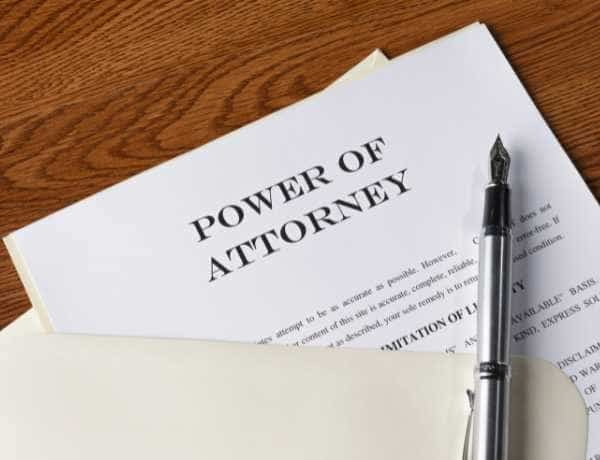
A Power of Attorney (POA) is a legal document that allows someone to act on behalf of another person, known as the principal. A Power of Attorney for an aging parent is a document that gives a designated individual the legal authority to make decisions and act on behalf of an elderly parent in the event they are no longer capable of making decisions or managing their affairs independently.

The legal profession is vast and varied, with many different types of attorneys specializing in different areas of law. One specialized area of the law is power of attorney. A power of attorney is a legal document that allows someone to act on behalf of another person. In this article, we will discuss the different types of power attorneys that exist.
A general power of attorney grants the agent broad authority to act on behalf of the principal in all matters, including financial and legal matters. This type of power of attorney is often used when the principal cannot manage their affairs due to illness or incapacity.
A limited power of attorney grants the agent specific authority to act on behalf of the principal in a limited capacity. For example, a limited POA may be used to grant someone the authority to sell a home on behalf of the principal.
A durable power of attorney remains in effect even if the principal becomes incapacitated. This type of POA is often used to ensure that someone can continue to manage the principal's affairs if they cannot do so themselves.
A springing power of attorney only becomes effective if a specific event occurs, such as the principal becoming incapacitated. This type of POA is often used to provide a safety net in case the principal cannot manage their affairs.
A medical power of attorney grants the agent the authority to make medical decisions on behalf of the principal if they become incapacitated or unable to make decisions for themselves. This type of POA is often used with a living will or advance directive.
A financial power of attorney grants the agent the authority to manage the principal's financial affairs if they cannot do so themselves. This type of POA can be general or limited in scope.
Having a POA over an aging adult can provide numerous benefits, including:
With a power of attorney, the designated person has the legal authority to make decisions for the aging adult. This can include decisions related to healthcare, finances, and legal matters.
If an aging adult becomes incapacitated and doesn't have a power of attorney, family members may need to go through a legal process to obtain guardianship or conservatorship. This can be time-consuming, costly, and emotionally difficult for all parties involved.
Knowing that a designated person can make important decisions on their behalf can provide peace of mind for the aging adult and their loved ones.
A power of attorney can help prevent the financial abuse of an aging adult by giving the designated person the authority to manage their finances and assets.
With a power of attorney, an aging adult can still maintain some level of independence by designating someone they trust to make decisions on their behalf when necessary.
As our parents age, it's essential to ensure they have someone who can make important decisions on their behalf if they cannot. One way to do this is by obtaining a power of attorney. Here's a step-by-step guide on how to get a power of attorney for an elderly parent.
The first step in obtaining a power of attorney for your elderly parent is to talk with them about the need for this legal document. It's important to explain the benefits and assure them it's not a sign of mistrust or lack of independence. Make sure they understand that it's for their own protection and well-being.
There are different types of power of attorney, and choosing the one that best suits your parent's needs is important. A durable power of attorney is a common choice, as it remains valid even if your parent becomes incapacitated. Other options include a limited power of attorney, which only covers specific actions, or a healthcare power of attorney, which allows someone to make medical decisions on your parent's behalf.
While obtaining a power of attorney without legal assistance is possible, consulting with an elder law lawyer is often recommended. They can ensure that the document is properly drafted and executed and that all legal requirements are met. They can also explain the rights and responsibilities of the agent (the person who will make decisions on your parent's behalf) and guide how to use the power of attorney.
Your parent will need to choose an agent to act on their behalf. This person should be someone they trust and who has their best interests at heart. It is essential to discuss the responsibilities and expectations with the agent before they agree to take on this role.
Once a power of attorney has been drafted and all parties agree, it's time to execute the document. This typically involves signing the document in the presence of a notary public or witness. Keep the original document safe and provide copies to your parent, the agent, and other relevant parties.
The person who should be in charge of a power of attorney for an aging adult is someone who is trustworthy, responsible, and has the best interests of the aging adult at heart. This person could be a family member, a close friend, or a professional legal or financial advisor. It is important to choose someone willing and able to manage the aging adult's affairs, including making important financial and medical decisions on their behalf. It is also important to have open and honest communication with the aging adult to ensure that their wishes are respected and their needs are met.
Deciding whether or not to obtain a Power of Attorney (POA) over an aging parent can be difficult. Here are some signs that may indicate that it's time to consider obtaining a POA:
If your parent's physical or mental health is declining, and they can no longer make decisions or manage their affairs independently, it may be time to consider a POA.
If your parent has been diagnosed with dementia, Alzheimer's disease, or other conditions affecting their cognitive function, they may need assistance managing their finances and making healthcare decisions.
If your parent has mobility issues that make it difficult for them to leave their home or travel, they may need assistance in managing their finances and healthcare.
If your parent is having trouble keeping up with their bills, or if you notice unpaid bills piling up, it may be a sign that they need assistance managing their finances.
If your parent is having trouble understanding financial matters or making money decisions, it may be a sign that they need assistance managing their finances.
If you notice any of these signs or other signs that indicate your parent may need assistance managing their affairs, it may be time to consider obtaining a POA. It's essential to talk with your parent about their wishes and involve them in decision-making as much as possible. You may also want to consult with a lawyer specializing in elder law to help you navigate the legal aspects of obtaining a POA.
A power of attorney can end in several ways, including the death of the person who granted it, revocation by the grantor, completion of the specified purpose, or expiration of the time period specified in the document. It can also be terminated by a court order or by the attorney-in-fact resigning from their role.
The person who can be Power of Attorney is typically trusted, has legal capacity, and is at least 18 years old. This can include family members, friends, or even a professional such as a lawyer or accountant. It is essential to choose someone responsible and capable of making important decisions on your behalf.
No, you cannot get power of attorney without the consent of the person you seek to represent. Power of attorney is a legal document that grants someone the authority to act on behalf of another person in some issues, and it requires the explicit consent of the person being represented. Any attempt to obtain power of attorney could be considered fraudulent or illegal without consent.
You can consult a lawyer or use online legal services that offer customizable Power of Attorney forms to get a Power of Attorney. You can also check with your local government offices, such as the county clerk's office, to see if they offer Power of Attorney forms or resources. Ensuring that the Power of Attorney document is legally binding and meets your needs and requirements is important.
Our expert partner attorneys offer free consultations for your claim.